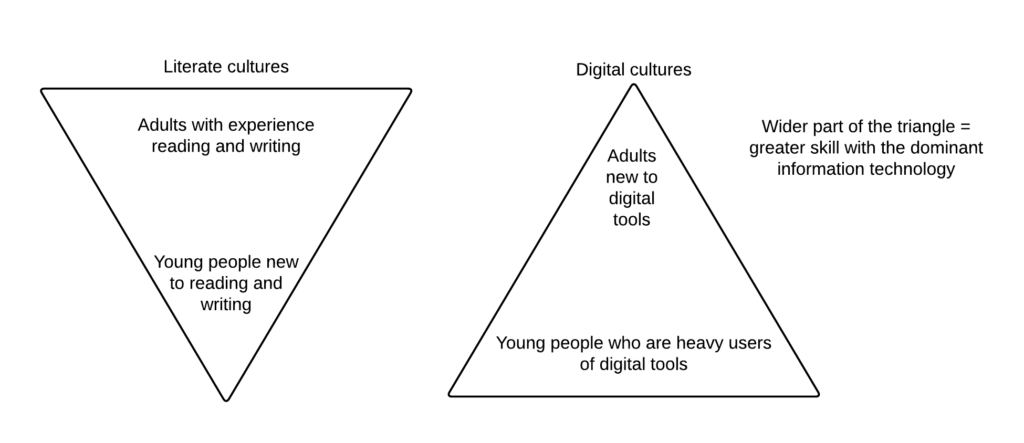For much of the 20th century, educators were adults who had earned an undergraduate degree which typically requires four years of study in higher education. As undergraduate students, these adults had become skilled users of print which was the dominant information technology in both society and school. As a result, educators were the most skilled users of the dominant information technology in classrooms. This is not the case in the 21st century.
Combined with young people’s quick acceptance of new technologies and their tendency to multitask, it is likely that the students in a typical 21st century classroom are more skilled using the ICT devices and the online information sources that are available for curriculum and instruction than the teachers. Some educators perceive this as an opportunity to learn and ask students for tips and tutorials; some educators see this as a threat to their authority and will avoid ICT as a result. This skill inversion does threaten to disrupt much of the school organization that became so common in the 20th century.


In Western cultures, the history of education is marked by a differentiation between everyday experiences and the explanations and language used in schools. Lev Vygotsky observed these differences and explained them. Everyday learning occurs primarily through speech and proceeds from sensory experience to generalization. Schooled learning occurs primarily through written language and proceeds from generalization to sensory experience. By connecting everyday experience to learning in schools, educators can make school meaningful and can lead to deeper understanding of everyday experience. In the ideal situation, educators will connect curriculum so that schooling reflects everyday experience; it has been argued that dissonance between schooling and everyday experience is the root cause of the perennial calls for school reform that have characterized recent decades.
Christine Greenhow, a scholar from the University of Minnesota, observed that the digital generations are active learners in informal settings and that ICT plays an important role in that learning. This combined with the observation that the dissonance results from difference between everyday experience and schooling, the work of embedding ICT into schooling represents an important challenge for 21st century educators. Greenhow (2008) stated the challenge for 21st century educators is to answer these questions:
Can educators similarly tap students’ enthusiasm and creativity to shape and carry out their education agenda? Can educators link students’ in-school learning and out-of school living to make education more relevant, meaningful, and connected to kids? Can we bridge conventional schooling practices (where content, in many ways, is centrally determined) with informal learning practices (where spontaneously create content and share (188)?
Meeting these challenges will require educators adopt and adapt strategies that reflect the emerging understanding of the nature of human knowledge and the role of technologies in human interaction.
Reference
Greenhow, Christine. 2008. “Connecting informal and formal learning experiences in the age of participatory media: Commentary on Bull et al. (2008).” Contemporary Issues in Technology and Teacher Education 8(2). Accessed January 2, 2018, http://www.citejournal.org/vol8/iss3/editorial/article1.cfm.